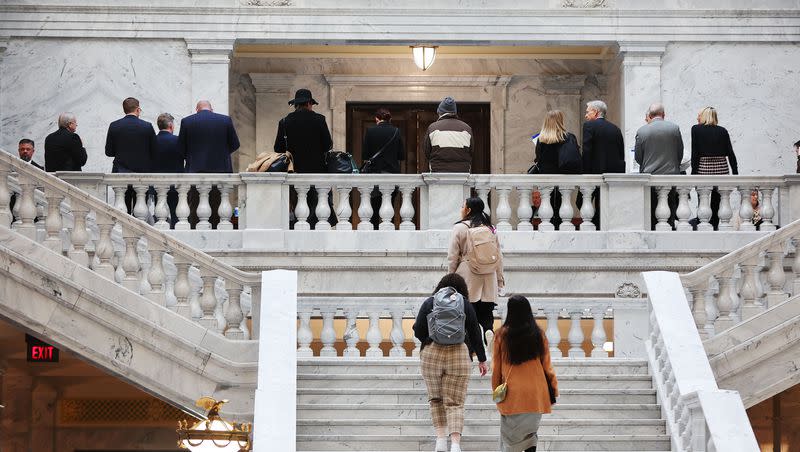Opinion: Here’s why Utah should not have a full-time, professional Legislature

Do you think Utah’s Legislature should meet longer than the current 45 working days required by the state constitution?
I’ll wait a moment while you pick yourself off the floor. After you have recovered sufficiently, consider this one: Do you think Utah’s elected lawmakers should serve full time, rather than be part-time lawmakers who also have full-time jobs elsewhere?
Last year, Utah lawmakers considered 929 bills and passed 575 of them. When I tell people this, they generally say they can’t think of 575 ways state government needed to interact differently with its residents last year, let alone 929 of them.
Lawmaking is, of course, more complicated than just thinking up new ways to interfere with people. Constituents, advocates and corporations contact lawmakers to point out problems that need fixing. New technologies, like artificial intelligence or self-driving cars, come along. Often, small technical adjustments are needed to existing laws.
But one thing is certain. Given more time, lawmakers would pass many more laws. Parkinson’s law, named for British naval historian Cyril Northcote Parkinson, states that public administration, bureaucracy and officialdom will expand to fill their allotted time spans.
Well, relax. Utah’s legislative leaders think the current 45-day limit, as well as the idea of a part-time “citizen” legislature, should be here to stay.
“I think that’s what makes Utah unique. I think that’s what keeps us somewhat normal,” new House Speaker Mike Schultz told the Deseret News/KSL editorial board this week.
That opinion is more unique, nationally, than you may think.
Related
Banning phones in class? Cheaper homes? Here are 5 key things to watch in Utah’s legislative session
The National Conference of State Legislatures actually keeps track of this stuff. It ranks states in five categories, according to their level of professional lawmaking. At one end are the states with full-time, well-paid legislators with large staffs. Think California and New York.
At the other end are 10 states marked as “part-time lite,” or states with legislatures that are part-time and paid little, with small staffs. Utah is in that list, but it has the largest population of any of the 10. The bigger the state, the greater the pressure to make lawmaking a profession.
“I feel it,” Schultz said of the pressure. Constituents are more engaged in lawmaking than they were before, and each lawmaker represents an increasing number of people. But he remains unmoved.
“If you make it a career, I just think that’s the downfall of many of these states.”
There are potential pitfalls to hanging on to a citizen Legislature in a growing state. Writing for marketplace.org, Savannah Maher noted one of them. You can end up with “a legislature that skews older, wealthier and more conservative than the state it represents.”
The companies and law firms that employ many part-time lawmakers consider it advantageous to have an employee in such an influential position, and they gladly allow time off from normal duties during the legislative session.
But a lot of ordinary folks can’t afford to run for office, either in the time it demands or the meager salary it provides. (Utah lawmakers receive $293.55, plus per diem, for each day they are in session.)
On the other hand, you would be hard pressed to show that California or New York receive better representation from full-time lawmakers.
The other concern is that, the bigger a state’s population becomes, the harder it is for part-time lawmakers to keep up with the needs. This, in turn, could empower a state’s full-time professional staff, whose job becomes tutoring lawmakers on important issues.
Schultz acknowledges this as a possibility, but he notes that in Utah, the staff members who draft bills, “the ones helping us get to good policies,” are not partisan.
In other words, they are not chosen for their party affiliations. Only staff members to the party caucuses are partisan.
As for the limited, 45-day session, I met an out-of-town lobbyist a few years ago who told me, after the first week of the session, that he was astounded at how much work was being done. Lawmakers started passing bills on the first day. In other states, he said, things move much slower.
“It forces us to be more efficient with our time up there,” House Majority Leader Jefferson Moss told the editorial board. “We have to get to work.”
I suppose that can be good or bad, as well. No one wants a hurried process, but lawmakers tend to study a lot of issues during their monthly interim meetings while the Legislature is not in session.
For the moment, at least, Utah’s citizen Legislature will be good enough to handle a state of almost 3.5 million people. Whether that’s true when the population reaches 5 million remains to be seen.

